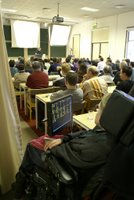 Since I don't get to do any experiments, wear a white (or any other colour) lab coat, or play around with impressive looking apparati, my attempts at depicting the kind of work I and my colleagues do are usually quite unimpressive. All we do everyday is sit around in our offices, in front of a computer or a notebook, occasionally scribbling random greek letters on a big whiteboard, accompanied by a cup of coffee in hand. No machines which go "bing!" The picture on the left is about as much fun as it gets, Stephen Hawking listening to a talk by Roger Penrose about his latest ideas on quantum state reduction via gravitational interactions.
Since I don't get to do any experiments, wear a white (or any other colour) lab coat, or play around with impressive looking apparati, my attempts at depicting the kind of work I and my colleagues do are usually quite unimpressive. All we do everyday is sit around in our offices, in front of a computer or a notebook, occasionally scribbling random greek letters on a big whiteboard, accompanied by a cup of coffee in hand. No machines which go "bing!" The picture on the left is about as much fun as it gets, Stephen Hawking listening to a talk by Roger Penrose about his latest ideas on quantum state reduction via gravitational interactions.So in a way I understand the urge to spice things up with unrepresentative imagery. Visually, a lot of a scientist's job is as interesting as any other office worker's. No one is really interested in seeing people think. Occasionally, there's a really animated discussion with equations and hands flying all over the place but that's about as exciting as it gets around here.
Still, why should scientists care about having their dull (at best), or menacing (at worst) perception by the world at large spruced up by photographic glitz? For me, it crosses the line between documentary and imaginary. A fundamental goal of science is to present the clearest and accurate picture of nature that we can. Although it is part and parcel of the day-to-day machinations of science that we may emphasize our own particular contributions, and and are every bit as emotionally involved in our work as anyone else, lying about one's work is an anathma. One can make an analogy with journalism, once a reporter starts making stuff up in their articles, they have crossed the line of jounalistic integrity. Scientists have at least as strong a responsibility to present fair, balanced and truthful accounts of their work as possible.
I would posit that this onus extends to the portrayal of the work we do, in whatever medium. Here, the TV show CSI and its spinoffs have a lot to answer for. Stylish offices, flashy computer graphics, DNA tests which take 10 seconds, these are all absolute fictions. Of course it's entertainment, but one of the main attractions of a show like that is it is supposed to make science, and scientists "sexy". However, there is a danger of misrepresenting what science can and cannot achieve, as well as giving a totally misleading account of work conditions.
Still, having to take pictures of my workmates at work (as opposed to at play) is akin to pulling teeth. It's not an easy job but the challenge to do it in an interesting way without resorting to gimmicks is a worthwhile one which I implore other photographers to tackle. Otherwise, it is missing spirit of science and doing it a disservice.
No comments:
Post a Comment